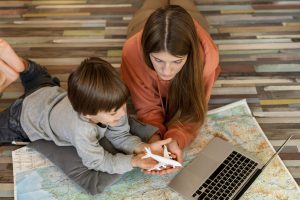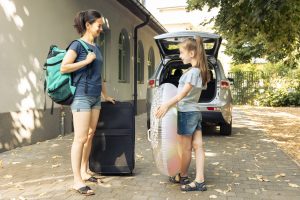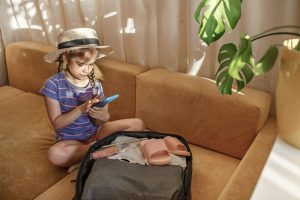Contents
The percentage of Georgia parents who have pulled their kids out of public school and made the switch to homeschool has more than doubled since the pandemic. The percentage changed from 7% in early 2020 to more than 16%, according to U.S. Census data. This percentage is even higher in other states. Parents are increasingly choosing homeschooling for their children.

Homeschooling is an alternative education choice parents make for their children. Parents choose this for various reasons, often due to dissatisfaction with traditional schooling. Homeschooling offers more freedom for children and allows families to travel. Families frequently travel turn homeschooling into roadschooling, which we discussed in this article. We will cover the basics of homeschooling and what parents can expect when combining it with travel in this article.
Why You Should and Should Not Homeschool?
Homeschooling has its pros and cons. Many parents note homeschooling allows them to provide their child with a higher quality education and imposes fewer limitations. Other parents point out while homeschooling has its advantages, it places a lot of responsibility on them. We discussed the pros and cons of homeschooling here. Parents look at these pros and cons to determine if homeschooling is the good decision for their family.
When To Start Homeschooling?
There’s no strict age limit or restrictions on when to start homeschooling. Parents transfer their child to homeschooling at any age. Many families prefer to begin homeschooling when their child is at kindergarten. Some families switch to homeschooling later. The key is to consider whether parents can invest enough time in their child’s self-learning and develop their discipline independently.
Is Homeschooling Legal?
Yes, homeschooling is legal in many countries. All U.S. states allow parents to educate their children at home. The situation with homeschooling in other countries differs. Many countries doubt parents can provide a child with a quality education on their own. Parents research local laws to check if they comply with their region’s requirements before beginning homeschooling.

What Does Homeschooling While Travelling Look Like?
“One of the biggest reasons we decided to homeschool was our desire to travel more as a family”
Terri Peters, Business Insider

Homeschooling while traveling gives families the flexibility to educate their children on the road. Here’s how homeschooling typically works.
Getting Started
Parents first study the laws of their country and state, especially when it comes to the USA. Once parents confirm homeschooling is allowed, they create a lesson plan and prepare everything necessary for effective homeschooling.
Digital Software and Tools
Homeschooling allows students to learn from anywhere in the world. Parents provide children with a laptop, tablet, or phone and pay for internet access. Having internet enables students to use online platforms where they attend lessons, such as ABCmouse. Parents download various educational programs to assist children in their studies. These programs include Grammarly, Quizlet, and others, depending on the specific tasks students need to accomplish.
Combining Learning with Travel
The advantage of homeschooling is it allows parents and students to travel. Travel enriches education by turning many subjects from mere theory into practice. Students learn about geography and hear about new places, but by traveling with their parents, they get to see these places firsthand. History, science, and many other subjects are strengthened through practical experience gained from traveling.
Planning
Homeschooling while traveling requires parents to plan ahead. Parents create a clear schedule and aim to establish consistent times for lessons and breaks for kids. This helps to instill discipline in their children. Some parents plan lessons weekly, while others prefer a monthly approach. Both options are effective, and parents choose the one feeling most suitable for their family.
Parents plan their travel itinerary alongside their education plan. They approach this planning with responsibility to ensure their children can reinforce theoretical knowledge with practical experiences.
Overcoming Challenges
An integral part of homeschooling is problem-solving. Parents face various challenges and resolve them so their children’s education does not suffer. These problems can include a broken laptop, faulty internet, and much more. Parents use websites like TechRadar to get more knowledge on how to deal with these problems.
Personalization
Parents keep detailed records of their child’s learning. This helps parents to provide proof the child is studying and to understand their learning curve. Such understanding allows for identifying strengths and weaknesses to personalize the program and make it effective for the child. Various applications help parents with tracking, storing, and processing materials. These applications include Trello, Evernote, and others.
5 Tips for a Pleasant and Effective Homeschool Traveling Experience

Traveling while homeschooling can be fun and educational. Here are five tips for homeschooling while on the go to make the experience better:
- Create an educational plan and a travel itinerary in advance. Discuss travel plans with your children to consider their interests and needs
- Research the places you want to visit to avoid issues like temporary closures or health risks
- Stay positive and encourage your child. Sometimes kids don’t want to travel due to a lack of motivation. Help them find something interesting
- Support your child in learning new technologies and programs to make their education more engaging
- Join homeschooling groups, such as Worldschoolers, to get advice from other parents and plan cost-effective travel routes
Homeschool Travel With Legacy Online School

Legacy Online School is accredited by the Western Association of Schools and Colleges. The diploma from Legacy Online School is widely accepted. Legacy Online School’s curriculum is designed for elementary, middle, and high school. The curriculum covers core subjects. These subjects include language arts, math, science, and social studies. We offer electives such as Spanish.
Our curriculum gives students plenty of options to find what suits them best. They choose from one-on-one sessions, small group live teaching, and more. Our expert team updates the curriculum constantly to improve it for students.
Our school is an excellent choice for homeschooling your children online. We got a prestigious award for the best homeschool curriculum. We shared more about this award here. Legacy Online School will keep providing education meeting high and innovative standards.
Join Legacy Online School today and give your child the best education.
Conclusion
Homeschooling opens up the opportunity for families to travel the world while educating their children. We’ve covered key considerations for families, exploring who should begin homeschooling, and when it’s the best time to start. Homeschooling is not legal in all countries. Homeschooling in the U.S. is legal, but parents must familiarize themselves with their specific state’s requirements. Homeschooling combined with travel brings unique challenges. Our team has explored these challenges and provided five tips on how to maximize the benefits of homeschooling on the go.











